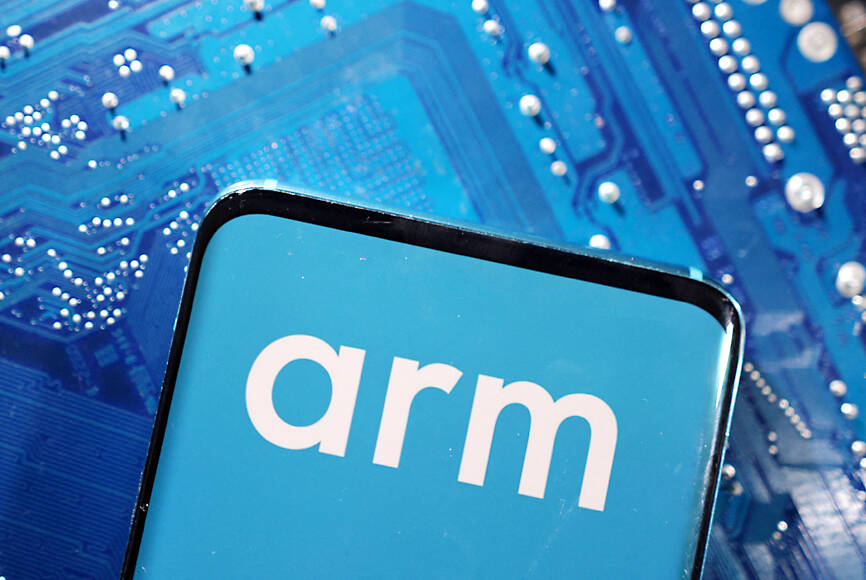As it seeks to pull off what could the largest initial public offering (IPO) of the year, Arm Holdings Ltd spent more than 3,500 words explaining the risks it faces in China, a critical market that accounts for about one-quarter of its revenue.
In a chunky section of the IPO filing’s 330-page prospectus, the British designer of chips detailed a litany of challenges in the nation: a concentration of business in the People’s Republic of China (PRC) that “makes us particularly susceptible to economic and political risks affecting the PRC”; a downward spiral in Asia’s biggest economy; rising political tensions with the US and the UK, and the potential complete loss of control over its pivotal Chinese subsidiary.
Arm runs most of its China business through an independent unit, called Arm Technology (China) Co (安謀科技中國), which is its single largest customer and accounted for about 24 percent of its sales in the year that ended in March, but Arm and its parent, Japan’s Softbank Group Corp, do not control that business.

Photo: Reuters
Instead, Softbank owns approximately 48 percent of Arm China, with the majority held by local investors, including entities affiliated with Allen Wu (吳雄昂), Arm China’s former chief executive officer who was fired over allegations of conflicts of interest in 2020. The prolonged power struggle still leaves open the risk of leadership changes and affects regional operations.
“We depend on our commercial relationship with Arm China to access the PRC market,” the filing says. “If that commercial relationship no longer existed or deteriorates, our ability to compete in the PRC market could be materially and adversely affected.”
More immediately, a slowdown in the world’s biggest smartphone market and manufacturing hub, as well as steps by the US and its allies to limit China’s access to leading-edge technology, are eating into sales. Arm had to sell architecture for lower-performance chips in China, the company said.
Arm’s royalty revenue growth in China slowed in the last fiscal year, and the company warned that royalty revenue and licensing revenue could take further hits.
Arm’s biggest customers include Apple Inc, which relies on China for close to 20 percent of its revenue every year, with its major hardware lines all powered by Arm-based processors. Leading mobile chipmakers Qualcomm Inc and MediaTek Inc (聯發科) sell the bulk of their chips, built on Arm designs, to Chinese smartphone makers.
The Cambridge-based company depends on a handful of companies for a majority of its sales. Five entities, including Arm China, accounted for a combined 57 percent of Arm’s total revenue for the fiscal year that ended on March 31, the filing says.
“A significant portion of our total revenue comes from a limited number of customers, which exposes us to greater risks than if our customer base were more diversified,” the filing says.
Arm is expected to target a valuation of US$60 billion to US$70 billion in its IPO, Bloomberg News has reported.

South Korea’s equity benchmark yesterday crossed a new milestone just a month after surpassing the once-unthinkable 5,000 mark as surging global memory demand powers the country’s biggest chipmakers. The KOSPI advanced as much as 2.6 percent to a record 6,123, with Samsung Electronics Co and SK Hynix Inc each gaining more than 2 percent. With the benchmark now up 45 percent this year, South Korea’s stock market capitalization has also moved past France’s, following last month’s overtaking of Germany’s. Long overlooked by foreign funds, despite being undervalued, South Korean stocks have now emerged as clear winners in the global market. The so-called “artificial intelligence

‘SEISMIC SHIFT’: The researcher forecast there would be about 1.1 billion mobile shipments this year, down from 1.26 billion the prior year and erasing years of gains The global smartphone market is expected to contract 12.9 percent this year due to the unprecedented memorychip shortage, marking “a crisis like no other,” researcher International Data Corp (IDC) said. The new forecast, a dramatic revision down from earlier estimates, gives the latest accounting of the ongoing memory crunch that is affecting every corner of the electronics industry. The demand for advanced memory to power artificial intelligence (AI) tasks has drained global supply until well into next year and jeopardizes the business model of many smartphone makers. IDC forecast about 1.1 billion mobile shipments this year, down from 1.26 billion the prior

People stand in a Pokemon store in Tokyo on Thursday. One of the world highest-grossing franchises is celebrated its 30th anniversary yesterday.

Chinese artificial intelligence (AI) start-up DeepSeek’s (深度求索) latest AI model, set to be released as soon as next week, was trained on Nvidia Corp’s most advanced AI chip, the Blackwell, a senior official of US President Donald Trump’s administration said on Monday, in what could represent a violation of US export controls. The US believes DeepSeek will remove the technical indicators that might reveal its use of American AI chips, the official said, adding that the Blackwells are likely clustered at its data center in Inner Mongolia, an autonomous region of China. The person declined to say how the US government received